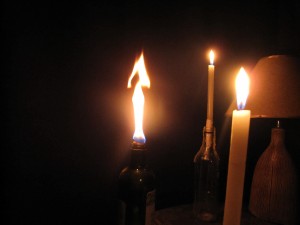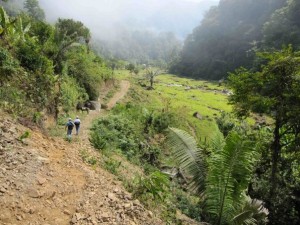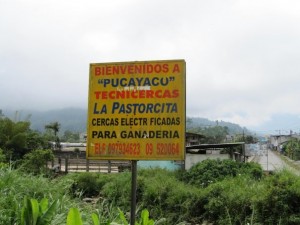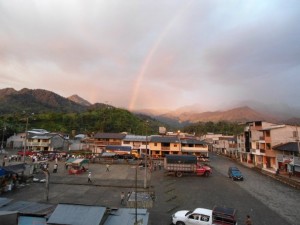My wife and I lived in a pretty remote part of Ecuador when we served as Peace Corps Volunteers a few years ago. Our town was located in the foothills of the Andes, a place called Pucayacu. To get there, you had to take a six-hour bus ride from the capital, where you’d wind up in this smallish city called La Maná. After that, you either had to find another bus, or take the more popular and faster method of travel: hopping on the back of a pickup truck and snaking up the unpaved mountain roads until there was no more road to snake along.
And that was Pucayacu. The town itself was only something like sixty years old, and all of the adults that I talked to could remember what it was like when their parents or grandparents first arrived. Back then, there wasn’t even yet a dirt road into town, so in order to gain any sort of access to modern society, they had to spend half a day hiking all the way down to La Maná, load up their mules with supplies, and then climb back up.
Also, electricity was a somewhat recent development. There were still parts of town without any access to power. “Are they planning on expanding the power lines so everybody has light?” “Yeah, ya mismo,” was the standard Ecuadorean non-answer to any question involving time, loosely translated as sometime between five minutes and five years from now.
The power lines that connected to our part of town were built sometime in the seventies, but even while we were living there, power was a sporadic luxury. It rarely went out for more than a day or two at a time, but blackouts were a constant threat. Every once in a while there’d be a really big storm, and somewhere between us and La Maná one of the wooden posts carrying the power lines would fall down, leaving us without electricity until the utility companies could manage to locate and repair the damaged areas.
Going without electricity on a semi-regular basis, at first it was kind of like a novelty, I’d romanticize the simplicity like I was on some sort of an adventure. But after a while, these brief outages would sometimes bring me to my knees, make me realize just how pampered of an upbringing I’d had, totally reliant on all of the modern technology that I’ve always known to be a constant in my life.
During the day, it didn’t really make too much of a difference. But at night, it was like living in an alternate reality. Because what are you supposed to do at six-thirty in the afternoon when the sun goes down and you’re enveloped in total darkness? Everybody else lit some candles and eventually went to sleep. But for whatever reason, I could never get my body to shut down that early.
Candles are really creepy. While they’re essential in helping you navigate your way around the house, they have the undesirable added effect of turning any room into the scene of a horror movie. The tiny beetles attracted to the only source of light would project massive monstrous shadows on the ceiling. Or every once in a while a random draft of air would either extinguish or double the size of the tiny flame, sending chills down my back, like a wandering spirit had just entered the building.
My wife and I would sit around and play cards, or if our laptop had enough a charge, we’d be able to watch one of the bootleg DVDs sold on any street corner in the country. But even that was just a temporary fix. Sooner or later we’d be right back to where we were, sitting in the void, with no choice really but to wait until the sun came back up.
It was always dark without the lights, but usually there was some sort of illumination. The moon or the stars would be out, our eyes would adjust, and if we looked out the window we’d be able to make out the square of houses that basically made up the entire town.
But I remember one night in particular, the electricity was out, and it was pouring rain, the clouds obscuring any access to the night sky. It was only like nine o’clock at night, but it felt like an endless three in the morning. The entire town was out, my wife was asleep, but for whatever reason I wasn’t tired yet. And so I just kind of lay there, underneath the mosquito net, I held my hand up in front of my face and tried to make out something, anything. It was total blackness, probably the only time in my life that I could recall experiencing an absence of any light whatsoever.
I thought about how unsettling it was, and then I started thinking about our ancestors, how human beings have been around for so long, and this age of industry, of electricity, we’re the privileged few that have ever had access to such unimaginable comfort. What would it have been like if I were living here two hundred years ago? I doubt my bed would have been as comfortable. There definitely wouldn’t have been a mosquito net.
I started to feel really small. And then I heard something fly in through the window. It was always hot and humid, so even though there were insects everywhere, we really didn’t have a choice but to leave the windows open at all times. We got used to it eventually, the giant spiders and grasshoppers that lined the outside of our protective netting when we woke up in the morning.
I’m just kidding, I never got used to it, not really. It was just a thin net, it wasn’t like a force field. If a bug got lucky, maybe it could crawl underneath, through the bottom, trapping itself inside with us. I heard this thing fly in the window, it must have been huge because the vibrations of its wings flapping were low and deep, resonant like a stealth helicopter.
I could hear it hitting the walls, hitting the net, hitting the window, each time it collided in the dark it would get frustrated, the buzzing intensifying, me curling up into the fetal position, afraid that it might cling on to one of my toes through the netting. This thing kept me awake for a while, I could tell that it felt trapped, completely unable to process how it went from being outside, flying around in the open air, to all of the sudden accidentally slipping through our open window and winding up stuck in our tiny bedroom.
It’s amazing that we’ve made it so far as a species, because that type of fear has to be universal. I think about before modern times, before electricity, it was every night, another absence of light, another opportunity to sit there curled up into a ball, hoping the noises of the dark weren’t the warning sounds of anything too serious, maybe you could fall asleep, hopefully make it to the other side somewhat comfortable. And it was like, whenever it got really dark like that, I kind of felt it too, my instinctual fear, bubbling up from I don’t even know where, unable to tell see exactly where I was, or how I might react if anything really bad were to actually happen.



